CMAT celebrates 10 years of struggle
On June 14, 15 and 16, the Convergence Malienne contre les Accaparements des Terres celebrates 10 years of fighting alongside rural and peri-urban communities.

On June 14, 15 and 16, the Convergence Malienne contre les Accaparements des Terres celebrates 10 years of fighting alongside rural and peri-urban communities.

Event organized by the Federation of Rural Workers and Farmers of the State of Maranhão - FETAEMA.
On June 12, 13 and 14, 2023, CESIR/FETAEMA, FETAEMA and affiliated unions are organizing the 1st Meeting of communities in agrarian and socio-environmental conflicts in Maranhao.
The meeting is a plenary session with direct talks by FETAEMA and affiliated unions monitoring territories in agrarian and socio-environmental conflict, with representatives of the federal government (Ministry of Agrarian Development and Family Farming, Ministry of Racial Equality, Ministry of Human Rights and General Secretariat of the Presidency of the Republic) and the state government (Secretariat of Human Rights and Popular Participation, Secretariat of the Environment and Natural Resources, Secretariat of Public Security), as well as representatives of the State Council for the Defense of Human Rights, the State Commission for Combating and Preventing Violence in Rural and Urban Areas, among others.
"We are organized and aligned against the violence that threatens and kills rural workers, family farmers and traditional peoples in Maranhão. Once again, FETAEMA and its 215 affiliated unions reaffirm their defense of agrarian reform and access to land for rural communities," said Edimilson Costa, FETAEMA's Agrarian Policy Secretary.
“A permanência das comunidades rurais nos seus territórios significa ter paz no campo, a manutenção dos recursos naturais, a soberania e segurança alimentar, em especial nesse momento em que mais de 33 milhões de brasileiros passam fome. Por isso, a FETAEMA e Sindicatos filiados historicamente lutam pelo direito à terra a partir de uma perspectiva da produção e reprodução da vida”, ressalta o secretário de Meio Ambiente da FETAEMA, Antônio Sorriso.
Let's talk to federal and state governments, as well as public agencies and entities, about what we stand for in the Maranhão countryside."
https://www.instagram.com/p/CtMn8_ipb8D/?igshid=MzRlODBiNWFlZA==
On April 12 and 13, 2023, representatives of the member organizations of the FLT steering committee met in Paris. This meeting on the future of the Forum was also an opportunity to inform each other on the evolution of land grabbing in the world and on the news of the struggles.
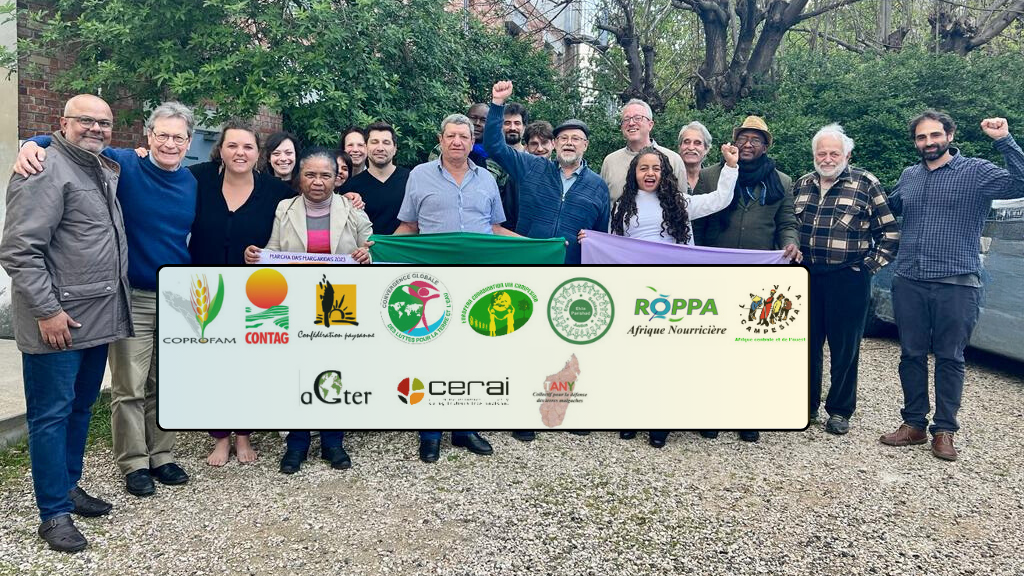
Some of them took the opportunity to explain the importance of the Forum des Luttes for them and their organization.
For each interview, you will find the translation in subtitles for French, English, Spanish and Portuguese.
Alberto Broch - President of COPROFAM
Ramesh Sharma - Ekta Parishad coordinator
Ibrahima Coulibaly - President of ROPPA
Ibrahim Sidibe - ROPPA representative
To share your news and appear on the current struggles page, please fill in the form:
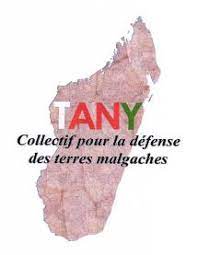
While public opinion is concerned about the final content of the amendments to the new land law relating to untitled private property (1), which are expected to be adopted during the current parliamentary session, a document by the International Finance Corporation (IFC) and the World Bank entitled "Private Sector Diagnostic - Creating Markets in Madagascar" published in December 2021 (2), is causing significant concern. Including recommendations on the "reform" of several laws so that foreign investors can become owners of Malagasy land, the land-related parts of its content deserve to be brought to the attention of all and to be denounced. This reminds us that the African Development Bank had issued as a condition for the allocation of funding from the Programme d'Appui à la Compétitivité Economique (PACE) in 2019 the adoption by the Malagasy leaders of regulatory texts relating to agropoles (3). The dramatic impacts of the possible application of these unacceptable proposals on the impoverishment of the already impoverished population require broad information and debate
I - What laws are mentioned that would allow foreign investors to own land?
1- The IFC and World Bank report starts with an analysis of the situation in Madagascar post-Covid 19. It highlights the country's flaws and shortcomings, already often mentioned, which would prevent the development of the private sector and the arrival of investors, such as governance and the lack of infrastructure in various areas. It then puts forward proposals to improve the "business environment" by asking in particular
2 - The chapter on land points out that the land market in Madagascar "is not functioning because of a precarious land tenure system that limits access to land for agricultural production and private sector enterprise development". According to the report, "foreigners cannot permanently acquire land, and the leasing framework does not provide sufficient security for long-term investments". It therefore suggests
The risk of the Malagasy government adopting these World Bank recommendations is very high because in a letter of intent to the International Monetary Fund (IMF) dated 24 February 2022, the Minister of Economy and Finance writes "We will continue our efforts to promote a favourable business climate, which is essential to stimulate private investment, as foreseen in our EMP (4). [...] In the framework of a new investment law, we intend [...], to strengthen the equal treatment of domestic and foreign investors, and to clarify [...] the issues of access to land and property rights" (5)
All of the laws mentioned have been strongly criticised by civil society organisations and others, however, and an unannounced presentation of new versions of these texts for a vote by parliamentarians in this May 2022 session would be completely unacceptable.
II - Why do these recommendations go against the development of the Malagasy?
1 - Legalizing the purchase of Malagasy land by foreign investors is dangerous for the existence of the majority of Malagasy in the medium and long term and for their economic, social, cultural and environmental rights. The glaring inequality of means could quickly lead to a massive transfer of land to foreign investors and to the availability of a minority share of the territory to Malagasy nationals with modest incomes. The Malagasy have a very strong attachment to land, as the report states. Three quarters of the population live from their work on the land. Land is not a commodity but a public good, precious, common to the whole Malagasy nation, which future generations will have to inherit to ensure their food sovereignty and development. The
guidelines for the protection of private property, skilfully laid down in the Constitution, have still not enabled Malagasy families to recover the vast and fertile land to which the colonists hold "definitive and unassailable" titles, and new laws risk facilitating the acquisition of land titles by foreign investors? Ensuring better access to land so that local communities can live in dignity and feed the nation cannot be confused with the establishment of neoliberal 'land markets'. We insist that the legalization of land purchases by foreign companies and other entities in Madagascar must be rejected as it is
contrary to the sustainable development of the Malagasy.(6)
2 - The references in the IFC and World Bank document to zoning and the framework law refer to two very controversial pieces of legislation
It was during a workshop organised by the Fonds National Foncier in Antsirabe in March 2020 on this last bill that a presentation on agropoles was made (9). We later learned that the "adoption of two decrees on the creation and management of agropoles constituted one of the conditionalities of the 3rd tranche of budgetary aid for Madagascar from the ADB under PACE III" (3). Like SEZs, agropolises refer to a set of enterprises, producers and services within a given geographical area, which "will benefit from measures relating to fiscal incentives and investment protection" (10). The National Strategy for Agribusiness tells us that 4 million hectares of agropoles are planned in the coming years in Madagascar (11). However, other countries that have experimented with this approach since the 2000s show that it does not always achieve the desired objectives and leads to harmful effects for small farmers (12). Based on existing long leases of 30 years or more, Malagasy civil society organisations have stated that 'with regard to investment zones, several examples show that successive leaders have favoured foreign investors by allocating them large areas [...]. The Malagasy families who occupied these lands then lost their places of life and work, as well as the ancestral lands where their culture took root, and saw their environment desecrated, denatured and destroyed, their water sources polluted and various diseases develop: their impoverishment and suffering are undeniable" (13).
This observation by Malagasy organisations is confirmed by a Land Matrix Initiative study published this week based on 740 cases of large-scale land allocations (of 200 ha or more), including Malagasy cases, which states that 'the overwhelming majority of land investments in Africa are still too often made to the detriment of local populations and the environment' (14).
The consequences of a final sale of land of varying sizes to foreign investors would be even more serious.
Conclusion
The demand for "access" to land ownership by foreign investors in Madagascar, as conveyed by the World Bank's private sector diagnosis, is scandalous because it does violence to Malagasy cultural values, cancels out any hope of sustainable development for the majority of the population, and aims to further enrich national and foreign oligarchs. It promises us even more inequality, not less. If the unequal treatment of existing investors and newcomers is a problem, it is in the direction of reducing the advantages of privileged investors that the laws should be modified, but not in the direction of the definitive stripping of the Malagasy generations of today and tomorrow of their land, which the
legalization of land sales to foreign investors will certainly cause.
The serious global food crisis that is beginning should push leaders to strengthen the means of production of all Malagasy peasants by facilitating their access to more land, compared to the current average of less than 1 ha per farm. On the contrary, to rely on investors and grant property rights to foreign investors, is this not to scorn peasants and condemn peasant agriculture to certain death?
Logic and coherence in the fight against poverty and famine should lead decision-makers to focus on ways to support Malagasy peasants to produce food independently for their families and for the local market, instead of favouring agribusiness and supporting projects that are suicidal for the population, such as the sale of Malagasy land to foreign investors and "Madagascar, Grenier de l'Océan Indien" (15, 16)
20 May 2022
Collectif pour la Défense des terres malgaches - TANY
patrimoine.malgache@yahoo.fr ; www.terresmalgaches.info ; www.facebook.com/TANYterresmalgaches
The TANY Collective is now on Twitter:
@CollectifTany
References:
(1) https://www.assemblee-nationale.mg/wp-content/uploads/2021/07/Loi-n%C2%B0-2021-016-propri%C3%A9t%C3%A9-
fonci%C3%A8re-priv%C3%A9e-non-titr%C3%A9e_corrig%C3%A9.pdf;
https://www.foncier-developpement.fr/actualite/madagascar-resume-et-analyse-des-points-saillants-de-la-nouvelle-loin2021-016-regissant-la-propriete-fonciere-privee-non-titree/
(2) https://www.ifc.org/wps/wcm/connect/4d681c7b-538c-4c59-bf59-f5030b76a561/CPSD-MadagascarFR.pdf?MOD=AJPERES&CVID=nSi04A9;
https://blogs.worldbank.org/fr/africacan/mobiliser-le-secteur-prive-pour-soutenir-le-developpement-de-madagascar
(3) Quote from the Note de présentation des projets de décrets régissant la mise en place des agropoles et les structures
de promotion et de gestion des agropoles par le Ministère In the 2022-2026 Country Strategy Paper, the AfDB no longer talks about agropoles but declares on several occasions that it supports the improvement of the business environment. https://www.afdb.org/fr/documents/madagascar-document-de-strategiepays-2022-2026.
(4) PEM: Plan Emergence Madagascar (5) https://www.imf.org/en/Publications/CR/Issues/2022/03/16/Republic-of-Madagascar-First-Review-Under-the-ExtendedCredit-Facility-Arrangement-Press-515241 page 66 paragraph 38. (6) https://www.assemblee-nationale.mg/wp-content/uploads/2020/11/Loi-n%C2%B0-2007-036-sur-les-Inv.%C3%A0-Mcar.pdf https://p1.storage.canalblog.com/28/03/448497/130046385.pdf (7) https://edbm.mg/wp-content/uploads/2017/12/Loi-n-2017-023_ZES.pdf (8) http://terresmalgaches.info/IMG/pdf/projet_de_loicadre_sur_les_terrains_a_statuts_specifiques_pour_observation_mars_2020.pdf
(9) https://www.lakroa.mg/item-2070_articles_economie_18-atelier-de-finalisation-du-projet-de-loi-sur-les-terrains-a-statutspacifique.html
(10) Technical Committee on Land and Development, 2022 (forthcoming) Special Economic Zones and Land Tenure: Global Trends
and Local Impacts in Senegal and Madagascar
Article published in " Campagnes Solidaires " by Jean François Périgné,
Mussel producer in Oléron and member of the International Commission of the Confédération Paysanne
n
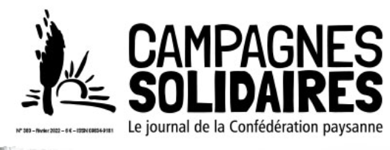
The Public Maritime Domain: an original way of managing a common property
France is the world's 2nd largest maritime power. For a very long time, it has established the principle that maritime space is a common good that cannot be privatized.
As early as 1160, Eleanor of Aquitaine established the rules of practice at sea and founded what was to become the social security system for seafarers (ENIM*) in a founding royal edict, "the roles of Oleron". It was not until Colbert's edict of July 31, 1681 that the rules in force today were established. This historical focus shows how relevant this "state" entry to maritime spaces is.
On this DPM*, which extends from the limit of territorial and international waters to the level of the highest seas towards the land, there is no lack of sea users. Fish farmers, fishermen, but also the merchant navy, extraction activities (aggregates, oil, minerals...) and of course the national navy. As for other users, there are the yachting of course, water sports and aquatic activities, leisure activities such as fishing on board or fishing on foot, or swimming ...
How can we manage the conflicts of use that are bound to arise when faced with a plethora of users with a sometimes incompatible approach between recreational and professional activities? A SMVM* is set up in close consultation with the different actors and the State. The maritime space is divided into "priority" (but not exclusive) allocation zones: navigation corridors for the merchant navy, military zones, shellfish farming or fishing zones, bathing zones, etc. This distribution is not fixed and can be reviewed and adapted to changes in use.
As far as our activities are concerned, the areas allocated in the SMVM to shellfish farming are cadastralized and allocated to professionals in the form of concessions. These are governed by strict specifications established in consultation between the DDTM* and the professional representatives of the CRC*. They cover technical issues (marking out, maintenance, animal loads, types of authorized installations, etc.), social issues (access priority, maximum surface area, etc.) and environmental issues (protection of spawning grounds, eelgrass areas (posidonia in the Mediterranean), cleaning of mudflats, etc.). Any development or installation must be able to be dismantled within 24 hours.
Any EU citizen of legal age with a BPAM* has access to the concessions. The fee is symbolic, but compliance with the rules is closely monitored. The newly installed person is given a temporary concession title for 5 years. This will be renewed in the form of a 25-year emphyteutic lease thereafter. At any time, failure to comply with the rules may result in dispossession.
After the trade, the vacant concession is posted with publicity in all the town halls of the maritime district concerned and the candidates make themselves known. It will be reallocated according to priority rules.
A concession title cannot be exchanged for cash. Only the installations in place (spinneret, bouchots, oyster tables) and the livestock present at the time of the transfer are subject to a financial transaction.
The concession title is nominative. This particularity protects the professionals from any attempts to enter the business by large agro-industrial or mass distribution companies. As in agriculture, there are company structures in shellfish farming, but in all cases the majority holder of the shares must meet the requirements mentioned above.
There is no minimum surface area to start with. The young person must strive to reach an "economically average" surface area after seven years, calculated on the basis of the annual census of shellfish farming activities. On the other hand, there is a maximum surface area beyond which the licensee can no longer apply.
This model, with adaptations, is more or less adopted in certain land areas (national parks, coastal conservatory, Larzac landholding). It is a lever to get out of the speculative context of private land ownership, a brake on expansion and a tool for protecting professionals. It establishes a "community of destiny" between professionals.
*ENIM : Etablissement national des Invalides de la Mer
*DPM: Public Maritime Domain
*SMVM: Scheme for the Development of the Sea
*DDTM: Departmental Directorate of Territories and the Sea
*CRC: Regional Shellfish Growing Committee
*BPAM : Brevet Professionnel Aquacole et Maritime
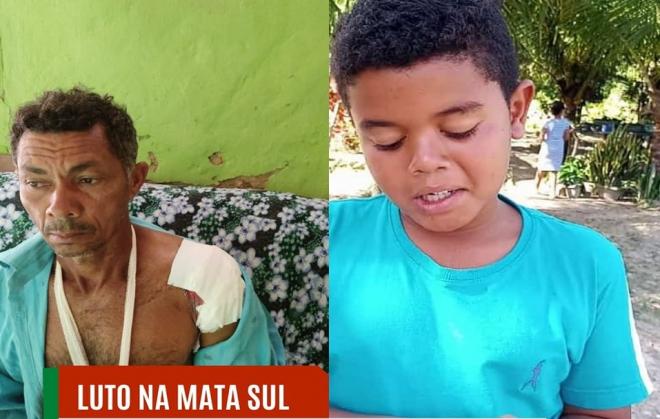
Last October we shared a video testimony in the framework of the forum of struggles "Engenho Roncadorzinoh, 40 years of struggle! (link: https://www.youtube.com/watch?v=BF6hromd-0U). An attack took place in the village on the night of 10 February 2022, which resulted in the death of a 9 year old child, son of one of the main leaders of the community and president of the association of family farmers in the region. He himself was injured but survived. The community has been in existence for 40 years and is home to around 400 residents, including 150 children. In recent years, the community has suffered several threats and violence from a private company, with the destruction of crops and contamination of water sources. The aim is to pressure the families to leave the area and free up the land to raise livestock. We invite you to share and disseminate this information to put pressure on the authorities to investigate and punish those responsible for this crime. You can find CONTAG's press release here: http://www.contag.org.br/index.php?modulo=portal&acao=interna&codpag=101&id=14678&nw=1&mt=1
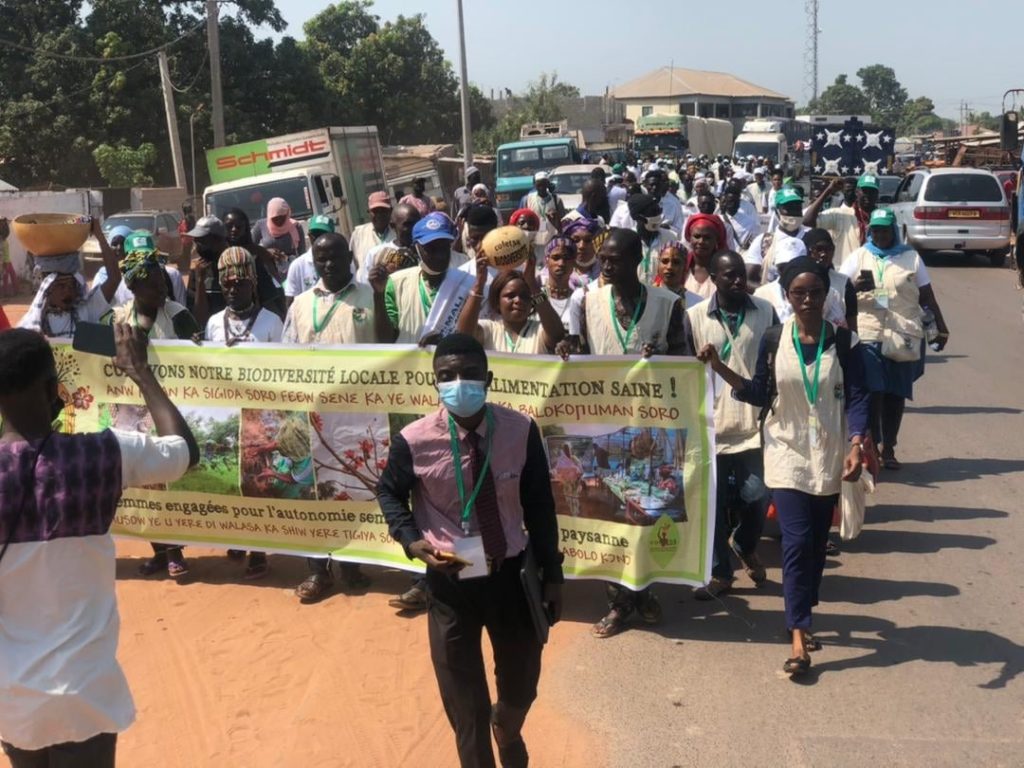
3rd edition of the West African caravan for the right to land, water and peasant agroecology...
The Caravan stopped over in Senegal and Gambia last weekend. In these two countries, the Global Convergence of Struggles for Land and Water - West Africa (#CGLTE_OA) advocated for an inclusive management of land governance. For a better promotion of family farming, the CGLTE-OA, invites the States to make quality seeds available to farmers. This caravan, which symbolises pan-Africanism in many respects, denounces the border harassment carried out by the security services of the sub-region, which hinders the free movement of people and goods. In The Gambia, it was the town of Brikama that received the Caravan. Tambacounda and Ziguinchor are the host cities for Senegal. In Casamance, the women of "USOFORAL" and the Conseil national de concertation et de coopération des ruraux - CNCR (National Council for Consultation and Cooperation of Rural People) led the visitors on a tour of the TOBOR agro-ecological farm (Bignona department). Guinea Bissau and Guinea Conakry will host this caravan before Sierra Leone, for the final stage. Enda Pronat at the heart of this caravan.
THE CATCH OF THE BASIN! 💥😁 3000 anti-basins meet in Mauzé-sur-le-Mignon and dismantle a "basin of shame" and its pump 🌊✊ Press release from the Earth Uprising, the Confédération Paysanne and Bassines Non Merci! This Saturday 6 November, more than 3000 people and 20 tractors gathered in Mauzé-sur-le-Mignon to put an immediate stop to the mega-basin construction sites in the Marais Poitevin. The rally was called by Bassines Non Merci, the LPO, the Confédération Paysanne and Soulèvements de la Terre, and succeeded despite intimidation from the prefecture, which wanted to ban the event, and from the FNSEA, which was organising a counter-demonstration to prevent us from acting. Farmers who protect their land, lovers of fauna and flora, and inhabitants of territories that are drying up took over the town hall square and then marched together in the streets of Mauzé, with more than 3000 people. The demonstrators and environmental protection organisations were able to see the drying up of the river Mignon, a situation that would become permanent if the basin projects were implemented. The demonstrators then collectively took over the site of an illegal 5-hectare mega-pool (180,000 m3), despite a strong police presence. The anti-pools had to cut through fields, escape tear gas and baton charges, cross a river on foot and pass through several police roadblocks, but were finally able to enter the site of the "pool of shame", a pool that had already been the subject of five court convictions. https://www.facebook.com/confederationpaysanne/videos/3115182438760172/?extid=WA-UNK-UNK-UNK-AN_GK0T-GK1C&ref=sharing The pump that feeds the basin and draws directly from the water table was dismantled by farmers and taken away. Once the crowd had climbed up the embankment of the basin, the pump was dismantled to put it out of action. The basin was emptied and the water returned to the water table! On their side, only a few hundred people gathered at the call of the FNSEA, the JA and the Coordination rurale to... protect an empty basin elsewhere, dry and dead like their vision of agriculture which destroys the territories and our farmers. For Nicolas Girod, spokesperson for the Confédération paysanne, this is "a full and resounding victory, a demonstration of strength that we are a popular movement, many of us fighting for a dynamic territory and a socially and ecologically just society project". We warn the holders of these basin projects: our determination to fight for a fair sharing of water resources remains unwavering, and it is time for you to abandon your projects, otherwise we will be back! In Mauzé, as elsewhere, we will continue to argue that water is a common good and that the soil must not be poisoned. NO BASSARAN!